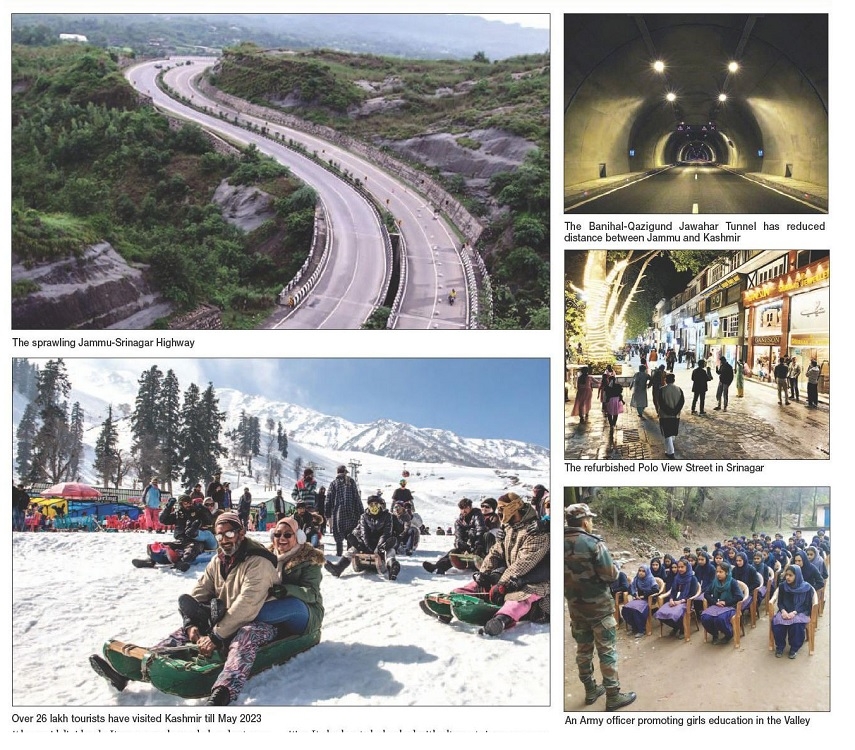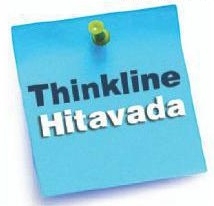Regaining The Paradise
| Date :11-Jun-2023 |

By RAHUL DIXIT :
J&K has woken up to a new dawn after removal of Article 370
Nestled in breathtaking meadows, surrounded by snow-capped mountains,the tiny Sarbal
boasts of being the ‘Last Village of Kashmir’.
After the reorganisation of the erst while
Jammu & Kashmir State, Sarbal now acts as
the gate way to Ladakh. Sitting at the foothills of Zozila
Pass,the little village of just150-200 population is basking in a new sunshine -- of education. The village now
has a school forits kids.Teachers from nearby towns are
imparting primary lessons to the children. The aim is
simple, no one should miss out on basic education.
Three hours away from Sarbal, in down town Srinagar,
the Polo View Street near the famous Lal Chowk is attracting a crowd for its ‘foreign look’. Developed under the
Srinagar Smart City Initiative,the stretch has undergone
a dramatic transformation. It is now a premium pedestrian market with finely paved road, aesthetic appeal,
and renovated building facades. The ‘foreign street’ is
pulling throngs of visitors and locals alike, bringing back
the buzz to the erstwhile market.
Far away, deep into the once-volatile interior towns, life
is charting the normal course.

There are no tensions.
Stone-pelting is a distant memory for the locals as well as the security forces. Youth is engaged in academic activities and earning live lihood even as tourist in flux is touching new heights each season. For the record, the first
half of 2023 registered 26 lakh tourist footprints in the
Union Territory, with the Valley accounting for a major
share. Adding to the bloom in tourism is the pouring in
of new investment sunder the New Industrial Policy.The
policy,introducedtwoyearsaftertheabrogationof Article
370, is vastly instrumental increating new employment
avenues, especially for youths.
Native stakeholders in the tourism, art and horticulture industries are waking up to newer potentials asreal
integration of the Valley with the mainland has gathered pace and the smokescreen erected by selfish political and separatist elementsin Jammu & Kashmiriswithering away. Kashmir is steadily and firmly regaining its
pristine image of being a Paradise, a Jewel in the Crown
of Mother India. The locals are reaping silent benefits of
the removal of Article 370. It might not figure in their
generalsentiment asthey term the issue as “purely political” but on the ground the historic decision taken by
the Centre on August 5, 2019 has ushered in a positive
metamorphosis.
THE BIG CHANGE
The Centre’s multi-pronged plans for development of
the newest Union Territory are on track and are visible
in the rapid construction of world-class road infrastructure.TheJammu-SrinagarHighway,dottedwithlong
and spacioustunnels, is cutting downthe travel distance
between the two regions by hours. It is a much-needed
initiative, for, the first imperative to actual development
of theValley is literal integration of Kashmir with Jammu,
two regions that come with their own, distinct
identities.
The National Highways Authority of
India (NHAI), the Armed Forces, and the
Border Roads Organisation (BRO) have
been instrumental in readying a solid infrastructure,includingtheall-weatherZozila
Pass tunnel till Ladakh that is set to be a
gamechangerin multiple manners. It will
not only take care of year-long trade and
tourism activities but will also provide
seamlessconnectivitytothesecurityapparatus guarding the restive border with
China.
Four years after the historic removal of Special Status
have brought in winds of change in Jammu & Kashmir.
It is still too early to call it a 360 degree transformation
but the anxiety and hesitation among the locals about
their future has clearly subsided. The UT has woken up
to a new dawn -- of development and a bright future. It
is definitely coming out of the heavy influence of ‘a few
families’whohadheld sway overthe erstwhile State. The
crackdown on the political-separatists nexus has broken
the back of anti-India forces. With no backing left from
their political mastersfor carrying outstone-pelting,the
brainwashed youth, too, have given up attacks on the
securityforces. Education opportunities and job prospects
are clearly weaning youth a way from the Pakistan-backed
radical elements.
After the abrogation of Article 370, the UT needed
some drastic measures to rein in the parties opposed to
the decision. The Centre decided to bite the bullet with
house arrest of the leaders of two mainstream parties,
National Conference and People’s Democratic Party, and
it has paid dividends.It was a much-neededandextremely bold step to come down hard on the political forces in
the Valley. There is now a dominant feeling among the
locals that they were cheated in the name
of Special Status all these years. Forthem,
the reality is also visible in hard numbers.
Under the New Industrial Policy 2021,
investments worth about Rs 2,200 crore
have come to J&K till financial year 2022-
23,creating employment opportunities for
nearly 10,000 youth.The UT is anticipating investment of further Rs66,000 crore.
The region also received its first Foreign
Direct Investment with Dubai’s Emaar
Group building a mega mall in Srinagar.
THE CHALLENGE AHEAD
Yet, these are still early days before integration of J&K
into the Indian union is complete in actual sense. The
G20 meeting in Srinagar last month did provide a great
optic.It gave a foundation for building further confidence
building measures in the region, but it has to be backed
by an independent administrative machinery. The Central
administration under the Lt Governor is definitely handling the affairs in an efficient manner, opening doors
for developmental progress. However, the future course
would need decentralisation of the process with more
powersto the local administration.Tourism remainsthe
backbone of Kashmir and it is only logical that the local
stakeholders are given freedom to operate under easily accessible administration.It entails cutting down on redtapism and doing away with archaic development procedures. Taking care of such teething problems would
senda positive message to the native communities whose
liveli hood is earned only through tourism-related activities.It also has to be backed with alternate income measures during the lean season which is the most vulnerable phase exploited by the separatist and radical forces.
Another major step whose time has come is opening
up of the political processin the region.The Centralrule
has played its part in changing the socio-political situation in the UT, but it cannot remain in place for a longer
duration. The restart of the political process will also
bringthetrickiesttestfortheCentre.Politics has aninherentassociation with separatist feeling in the Valley. Despite
the change inground situationwhere youthhasrealised
the hollowness of lofty dreams shown by some parties,
there will be attempts to foment unrest in the society on
religious grounds. It can be handled only with a systematic push of developmental projects, quality educationalinstitutes,andtopmedical care thatautomatically
cuts religious fanaticism in the society.
SECURITY DYNAMICS
Also, the integration of J&K with other parts of the
country hasto come underthe vigilant eye of the Armed
Forces. There is no point denying the fact that the Army
is an integral part of security in Jammu & Kashmir. The
presence of forcesis a necessity that just cannot be compromised for political optics. Though there is a drastic
decrease in terror attacks in the UT, a long journey has
to be traversed before the element of terrorism is completely wiped out from Kashmir.
That the Army, too, considers it as a newer challenge
is evident from therecent comment by Northern Command
chief Lt Gen Upendra Dwivedi who acknowledged, “The
last two years have brought to the fore newer challenges
in thewake of the abrogationof Article370,theGalwan
conflict and multiple waves of Covid-19.” It was for the
first time since the removal of Special Status that the
Army referred to it as one of the newer challenges in
Jammu and Kashmir. The statement perfectly reflects the
challenges posed by political decisions, both in short and
long terms.
First hint of the “newer challenge” wasfelt just ahead
of the G20 meeting when a terrorist attack killed five
Indian Army soldiersin Poonch region.The attack came
in wake of discussions on a plan to withdraw Rashtriya
Rifles(RR) from the Valley to let the Central Reserve Police
Force (CRPF) take charge of the region. Subsequently,
the Government took the wise step and cancelled
the plan.
The developments again underline that fact that Kashmir
needs a robust security blanket for many more years. It
would be a self-goal by the political community to compromise on the security of J&K for the sake of geopolitical optics. The regaining of the Paradise has entered a
critical phase. All it needs is patient handling and
dollops of confidence building measures.